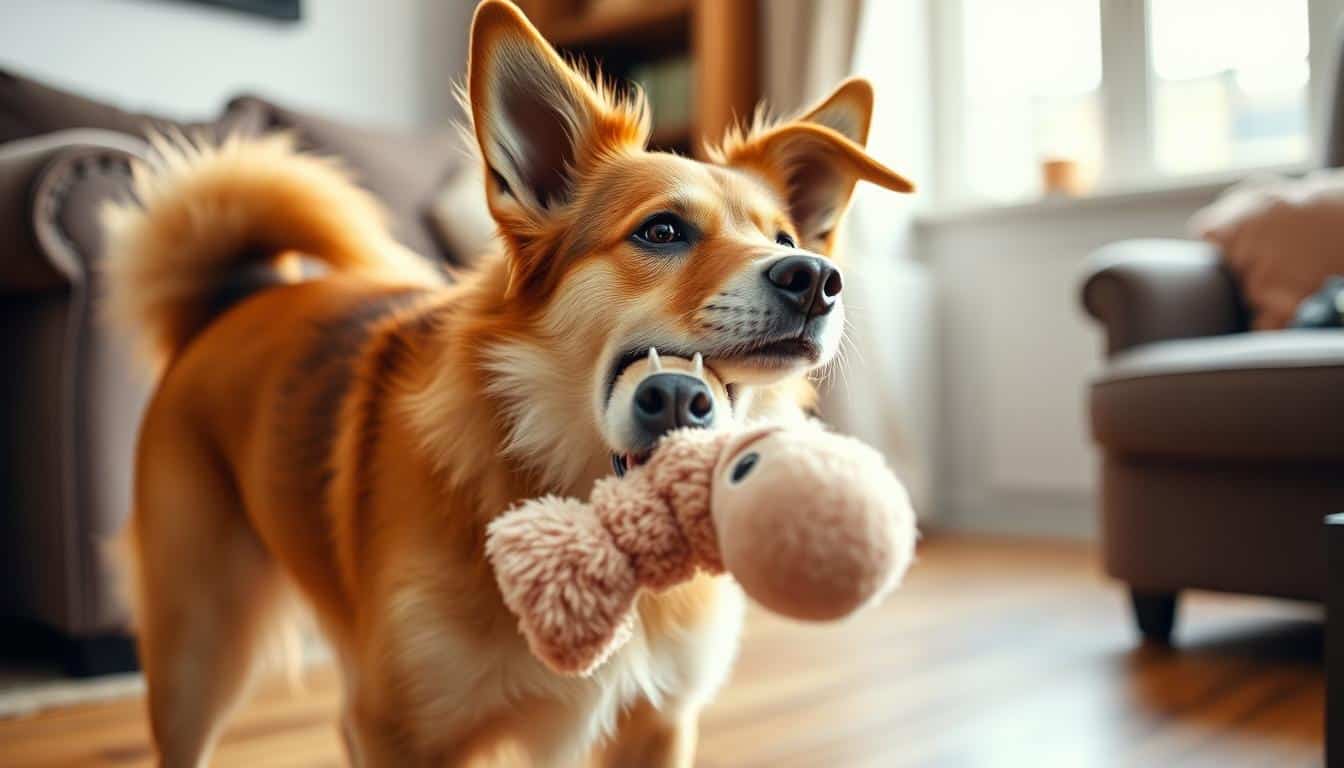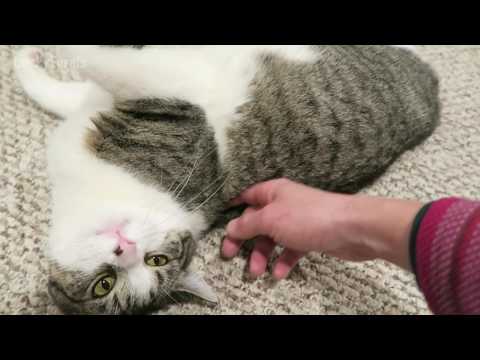Dog owners often wonder why their female dog whines and carries a toy. This behavior shows different emotional and biological signals. It’s a way for dogs to communicate their needs and feelings.
Female dogs might do this for many reasons. It could be because of their maternal instincts, emotional needs, or hormonal changes. Whining and carrying a toy can be a way for them to send a message about how they’re feeling.
Some dogs carry toys and whine to get attention or to manage their anxiety. Each dog is different, and their reasons for this behavior can vary. It’s important to understand what’s behind their actions.
Key Takeaways
- Whining and toy carrying can indicate complex emotional states in female dogs
- Potential reasons include maternal instincts and hormonal changes
- Understanding context helps interpret the dog’s specific communication
- Behavior might signal attention-seeking or emotional needs
- Professional veterinary consultation can clarify persistent behaviors
Understanding Natural Canine Behaviors and Toy Carrying
Dogs are complex creatures with rich behavioral patterns that often puzzle their owners. When a male dog whines and carries a toy, he’s communicating through deeply rooted instinctive behaviors that go beyond simple play.
Canine communication is a multifaceted system of signals and expressions. Toy carrying serves several critical functions in a dog’s social and emotional world.
Instinctive Pack Behaviors
Dogs are descendants of pack animals with strong survival instincts. When a male dog whines and carrying a toy, he might be demonstrating inherited behaviors from wild ancestors:
- Simulating hunting and retrieving skills
- Showing protective tendencies
- Practicing resource guarding
The Role of Toys in Canine Expression
Toys are more than just playthings for dogs. They represent comfort, security, and communication channels. A dog might use a toy to:
- Seek attention from their human companions
- Signal emotional states
- Manage stress or anxiety
Emotional Significance of Toy Carrying
Understanding why a male dog whines and carries a toy requires recognizing the deep emotional intelligence of canines. Toys can be surrogate companions, helping dogs process feelings of comfort, loneliness, or excitement.
A toy is not just an object, but a complex emotional tool for dogs.
Maternal Instincts and False Pregnancy in Female Dogs
Female dogs have unique hormonal cycles that lead to interesting behaviors. False pregnancy, a natural event in female canines, causes them to show nurturing instincts. This happens even if they’re not pregnant.
During a false pregnancy, a female dog might act in certain ways:
- Carrying toys as if they were her puppies
- Whining and protecting selected objects
- Creating a nest or sleeping area
- Showing emotional attachment to specific toys
These actions come from hormonal changes after a heat cycle. Progesterone and prolactin levels are key in these responses. When a dog whines and carries a toy, it might be her body getting ready for motherhood.
Vets say false pregnancy is a normal part of a dog’s life. Some dogs become more protective and vocal. They also show a strong bond to toys during this time. The level of these behaviors can differ from dog to dog.
Not all false pregnancy experiences are identical, and some dogs might show more pronounced symptoms than others.
Knowing about these natural instincts helps dog owners support their pets. It also helps them understand when their dog’s behavior is part of a normal cycle.
Why Is My Female Dog Whining and Carrying a Toy: Common Reasons
Dog owners often wonder why their female dogs cry with their toys. This shows complex emotional behaviors that can puzzle even experienced pet parents. To understand these actions, we need to look into canine communication and emotional expression.
Dogs communicate in many ways, and toy-related whining is a big part of it. These actions are not random. They are deeply rooted in their instinctual and psychological needs.
Seeking Attention Through Toy Play
When a dog cries with her toy, she might be trying to get her owner’s attention. This behavior shows several things:
- Desire for interactive playtime
- Wanting recognition from their human companion
- Signaling a need for engagement
Expression of Emotional Needs
Emotional expression is complex for dogs. Why is my dog crying with her toy could show many feelings such as:
- Feeling lonely or anxious
- Experiencing separation stress
- Seeking comfort through familiar objects
Signs of Physical Discomfort
Sometimes, toy-related whining might signal physical discomfort. Dogs can’t talk about pain, so they use other ways to show it.
“Dogs speak volumes through their body language and behaviors” – Canine Behavior Experts
Persistent whining while carrying a toy could mean health issues. These issues might need veterinary attention.
Hormonal Changes and Their Impact on Dog Behavior

Hormonal changes can make a dog carry a toy and whine. Female dogs go through big hormonal shifts. These changes can affect their behavior a lot, especially during heat cycles, pregnancy, or after spaying.
Dogs go through important hormonal stages. These stages change how they feel and act:
- Heat cycle hormonal fluctuations
- Pregnancy-related hormonal changes
- Post-spaying hormonal adjustments
During these times, a female dog might carry a toy and whine. Reproductive hormones like estrogen and progesterone can make them act like a mom. They might see toys as their puppies.
Hormones can change how a dog behaves in many ways:
| Hormonal Stage | Behavioral Characteristics |
|---|---|
| Heat Cycle | Increased attachment to toys, restlessness |
| Pregnancy | Protective behavior, constant toy carrying |
| Post-Spaying | Potential mood changes, comfort-seeking behaviors |
Knowing about these hormonal changes helps dog owners understand their pet’s behavior. It helps them give the right care and support during these times.
The Connection Between Anxiety and Toy Attachment
Dogs deal with anxiety in their own special ways. Carrying a toy and crying can be a big emotional coping method. It shows deeper emotional issues that pet owners need to get and tackle.
Anxiety in dogs shows up in many ways, with toy attachment being a key comfort strategy. Knowing these signs helps owners offer better emotional support.
Separation Anxiety Symptoms
Dogs with separation anxiety might show certain behaviors when they carry their toys and cry:
- Excessive whining while holding a favorite toy
- Clingy behavior around specific toys
- Increased vocalization when separated from owners
- Compulsive toy carrying
Environmental Stress Factors
Many environmental triggers can cause a dog’s anxiety and toy-related behaviors:
| Stress Factor | Potential Impact |
|---|---|
| Household Changes | Increased toy attachment |
| New Family Members | Heightened protective behavior |
| Loud Noises | Seeking comfort through toys |
Comfort-Seeking Behaviors
When a dog carries her toy and cries, she might be looking for emotional security. Toys represent safety and familiarity in uncertain times, acting as a psychological anchor for stressed dogs.
Spotting these anxiety signs lets pet owners create supportive plans. These plans help dogs feel safe and understood.
Different Types of Dog Whining and Their Meanings

Understanding why a female dog whines and carries a toy is key. Dogs use different whines to send messages. Knowing these sounds helps pet owners understand their dogs better.
Dogs have unique ways to show their feelings through whining. When a female dog whines and carries a toy, she might be trying to say a few things:
- Attention-seeking whine: A high-pitched, repetitive sound indicating desire for interaction
- Anxiety-related whine: A softer, more trembling vocalization suggesting emotional distress
- Playful whine: An excited, short-burst sound accompanying toy presentation
- Protective whine: A low, rumbling vocalization when feeling threatened
The context of the whining is very important. A female dog whining while carrying a toy might show her maternal side. This could be due to hormonal changes or nesting behaviors. Some dogs treat toys like “puppies” during emotional times.
“Dogs communicate through a complex language of sounds, and whining is their most nuanced vocal expression.” – Canine Behavior Research Institute
Veterinary behaviorists say to watch the pitch, duration, and body language of your dog’s whine. These details can show if your dog is in pain, stressed, or just wants to play.
When Toy Carrying Becomes Excessive: Warning Signs
Dog owners often wonder why their male dog whines and carries a toy all the time. While it’s normal for dogs to carry toys sometimes, too much of it can mean there’s a problem.
It’s important to know when your dog’s behavior is not normal. This is key to keeping your pet happy and healthy. Some signs might show that your dog needs help.
Behavioral Changes to Watch For
Dogs talk to us in many ways, and carrying a toy too much is a warning sign. Look out for these signs:
- Constant whining while holding the toy
- Inability to release the toy
- Aggressive protection of the toy
- Compulsive carrying that interrupts daily activities
- Signs of distress when separated from the toy
When to Consult a Veterinarian
Knowing when to see a vet is important to avoid health problems. If you see these signs, it’s time to make an appointment:
| Behavioral Indicator | Potential Concern |
|---|---|
| Persistent whining and toy carrying | Possible anxiety or hormonal imbalance |
| Sudden behavioral change | Potential underlying medical condition |
| Extreme possessiveness | Potential psychological stress |
Professional guidance can help determine whether your dog’s behavior stems from psychological or physical challenges.
Training Solutions for Excessive Whining and Toy Carrying

Understanding why your dog whines and carries a toy is key to training. Dogs often do this to communicate or express emotions. Training can help change these behaviors and improve your bond.
Effective training involves several steps:
- Find out why your dog whines and carries a toy
- Use positive reinforcement
- Stick to a consistent training schedule
- Keep your dog’s mind and body active
Positive reinforcement is vital for addressing toy-carrying and whining. Reward calm behavior and teach new ways for your dog to ask for things. When your dog whines or carries a toy too much, try these:
- Guide them to a specific task or command
- Give them other toys to play with
- Teach them to be quiet
- Keep a regular daily routine
Professional trainers suggest a structured environment to reduce anxiety. This includes regular exercise, mental games, and playtime. It helps your dog feel safe and understood.
A calm and patient approach is key to modifying your dog’s whining and toy-carrying behaviors.
If you’re still facing challenges, talk to a professional dog behaviorist. They can create a plan just for your dog. Remember, every dog is different, and what works for one might not work for another.
Understanding the Difference Between Normal and Concerning Behavior
Pet owners often wonder why their dog cries with a toy. This can be a complex signal. It’s important to know the difference between normal and concerning behaviors.
Dogs talk to us in many ways, and toys are a big part of it. Some behaviors with toys are natural, while others might show deeper issues.
Identifying Normal Toy-Related Behaviors
Healthy toy behaviors include:
- Occasional gentle whining while holding a toy
- Carrying toys to show affection
- Playful interactions with toys
- Periodic soft crying when seeking attention
Red Flags in Dog Behavior
Some behaviors with toys might be a sign of trouble:
- Constant, intense whining that seems distressed
- Aggressive guarding of toys
- Compulsive toy-carrying that interferes with daily activities
- Signs of physical discomfort while interacting with toys
Signs that need a vet’s help include persistent unusual behaviors, sudden changes in toy interactions, or signs of physical pain.
Conclusion
Understanding why a female dog carries a toy and whines is key. Dogs use many ways to communicate, and carrying a toy can mean different things. It could be due to maternal instincts, anxiety, or just wanting to play.
It’s important for pet owners to watch how their dogs act. Knowing what makes them carry a toy and whine can help solve the problem. If your dog’s behavior changes a lot, it’s a good idea to talk to a vet.
Every dog is different, and they all communicate in their own way. Owners who pay attention and understand their dogs can have a deeper bond. Training and positive feedback can also help manage confusing behaviors.
In the end, dogs carrying toys and whining is just part of being a dog. By being attentive and caring, owners can make their dogs feel safe and loved. This is true at all stages of a dog’s life and through all their emotions.




